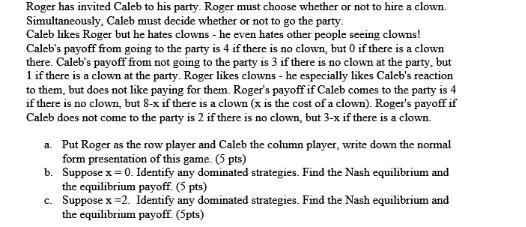Answered step by step
Verified Expert Solution
Question
1 Approved Answer
Roger has invited Caleb to his party. Roger must choose whether or not to hire a clown. Simultaneously, Caleb must decide whether or not

Roger has invited Caleb to his party. Roger must choose whether or not to hire a clown. Simultaneously, Caleb must decide whether or not to go the party. Caleb likes Roger but he hates clowns - he even hates other people seeing clowns! Caleb's payoff from going to the party is 4 if there is no clown, but 0 if there is a clown there. Caleb's payoff from not going to the party is 3 if there is no clown at the party, but 1 if there is a clown at the party. Roger likes clowns - he especially likes Caleb's reaction to them, but does not like paying for them. Roger's payoff if Caleb comes to the party is 4 if there is no clown, but 8-x if there is a clown (x is the cost of a clown). Roger's payoff if Caleb does not come to the party is 2 if there is no clown, but 3-x if there is a clown. a. Put Roger as the row player and Caleb the column player, write down the normal form presentation of this game. (5 pts) b. Suppose x = 0. Identify any dominated strategies. Find the Nash equilibrium and the equilibrium payoff. (5 pts) c. Suppose x =2. Identify any dominated strategies. Find the Nash equilibrium and the equilibrium payoff. (5pts)
Step by Step Solution
★★★★★
3.48 Rating (171 Votes )
There are 3 Steps involved in it
Step: 1
a The normal form presentation of the game is as follows Caleb goes to the party Caleb doesnt go to ...
Get Instant Access to Expert-Tailored Solutions
See step-by-step solutions with expert insights and AI powered tools for academic success
Step: 2

Step: 3

Ace Your Homework with AI
Get the answers you need in no time with our AI-driven, step-by-step assistance
Get Started


